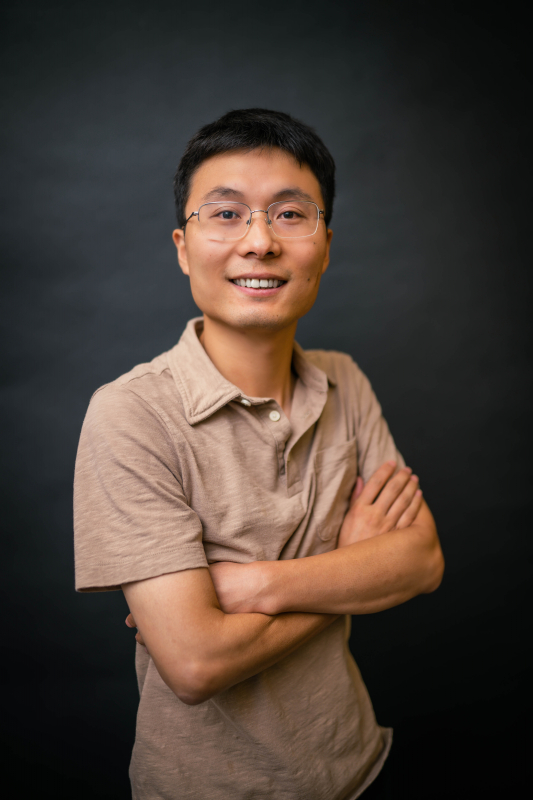For Mingjian Wen, a new Assistant Professor and Presidential Frontier Faculty Fellow in the William A. Brookshire Department of Chemical and Biomolecular Engineering at the Cullen College of Engineering, the interplay of materials and computational techniques is what drives his research and intellectual curiosity.
“I use modern computational techniques, such as machine learning and high-performance computing, to find new molecules and materials for energy and healthcare applications,” he said, pointing to lithium-ion batteries as an example of an item that could be improved.
“Lithium-ion batteries have enabled the widespread use of smart phones and electric cars. But most of us have to recharge our phones every day, and our electric cars can drive for only about 300 miles on a single charge. Both are limited by the amount of energy a battery can store. One branch of my research is to find new materials that can significantly improve battery performance. This is a very challenging task given the complexity of a battery. We tackle this with computational approaches by utilizing machine learning models and molecular simulations to search for candidates. The candidate materials are later tested and verified by experimental collaborators.”
While lithium-ion batteries are one example, this sort of cross-pollination between materials and computers can be applied to other areas as well.
“The techniques underlying my research, such as machine learning, atomistic molecular simulation and high-performance computing, can be easily transferred to understand other materials,” he said. “I am expanding my research to investigate nanoporous materials and drug molecules, hoping it can help to address current energy and healthcare challenges.”
Wen earned his doctorate in Aerospace Engineering and Mechanics at the University of Minnesota, Twin Cities. He earned his B.S. in Chemical Process Machinery Engineering from Tianjin University, China. Before coming to UH, he worked as a postdoctoral researcher at the Lawrence Berkeley National Laboratory in the Energy Storage and Distributed Resources Division.
Wen spoke highly of his two mentors from Minnesota and Berkeley when it came to developing his own interest in research and academia.
“I first developed my interest in academia while I was a graduate student working with Prof. Ellad Tadmor at the University of Minnesota,” he said. “The most significant influence Prof. Tadmor had on me was his research appetite for addressing problems that would benefit an entire research community. The OpenKIM Project I worked on in my PhD strives to make classical molecular simulations of materials reliable, reproducible and accessible, and we’ve developed a set of computational tools and webapps for this,” he said. “I am very glad to see that it has been benefiting many researchers who perform molecular simulations to understand and design materials.”
Wen also identified his postdoctoral research advisor as being important to his development.
“After obtaining my Ph.D., I joined Prof. Kristin Persson’s group as a postdoc at Lawrence Berkeley National Lab to continue my training on materials discovery and developing open scientific infrastructure. Managing the Materials Project, the world’s leading materials genome project, Kristin’s group offers open access to computed information and analysis tools of materials to inspire and design novel ones. Kristin has created an unrivaled research atmosphere in her group. People in the group are very kind to each other and are always willing to help. I very much enjoyed all kinds of conversations, both inside and outside academic settings, with graduate students, postdocs, staff members and Kristin herself. This is the type of research group I am envisioning for my own, and I am working toward it from day one.”
Wen joined the faculty in September 2022, after seeing a posting on Twitter by Lars Grabow, Dan Luss Professor of Chemical and Biomolecular Engineering, about the job opening in the Fall of 2021 and applying for the job. He added that he had known a couple of other professors working on materials research here at UH for quite some time, like Jakoah Brgoch in Chemistry and Pradeep Sharma in Mechanical Engineering.
“The hiring area – Applied Data Science, Artificial Intelligence and High-Performance Computing – was what I had been working on and hoped to continue with in my career. It is a perfect match for me,” Wen said.
Wen was hired via UH's Presidential Frontier Faculty program, which is focused on hiring a large cohort of convergence research faculty to respond to federal priorities and societal challenges.
“Dr. Wen is an outstanding young scholar in the field of Computational Materials Science whose research interests are aligned with the UH strategic plan in the area of Energy Transition to more sustainable and environmentally-friendly technologies. My colleagues and I are delighted that he joined our Department,” said T.J. (Lakis) Mountziaris, Ph.D., William A. Brookshire Professor and Department Chair.
“With my expertise in data science and AI, I see great potential to work together with my peer new hires and existing faculty members,” Wen said. “I am very grateful to the generous startup support of the program, which jumpstarts my independent research by providing enough personnel and computing resources.”
Wen noted that he did speak with and know some of his colleagues before joining the Cullen College of Engineering, and this also made the position attractive.
“I had various conversations with faculty members from UH, and I genuinely felt very welcomed here. My UH colleagues are very supportive and more than willing to help young faculty members to prosper,” he said.
